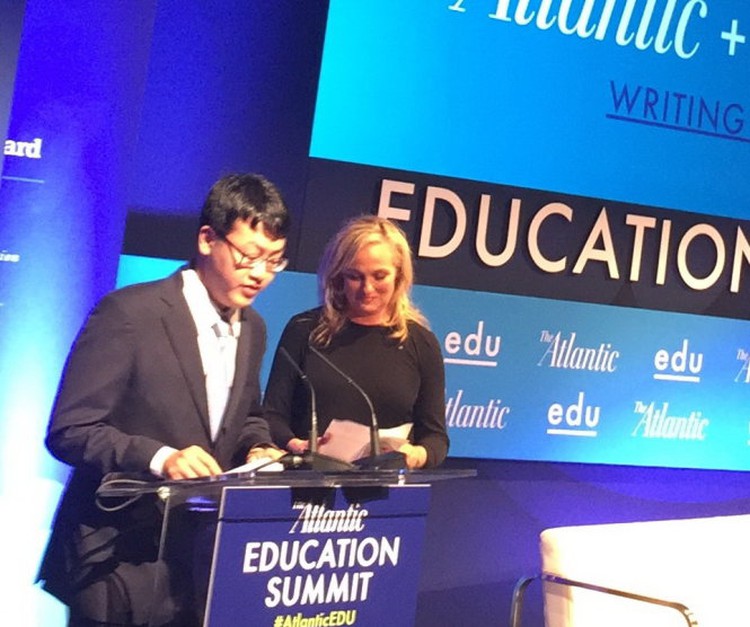
There is something to say about the academic achievements of Nguyen Tien Thanh, an 18-year-old student from Hanoi. He has won a US$300,000 scholarship to Duke University, scored 2380/2400 on his SAT test, and claimed the top prize of a College Board-backed international writing contest.
Winning the Writing Prize, the second annual award offered by The Atlantic magazine and College Board – the not-for-profit organization that owns the SAT – has put Thanh in the media spotlight both internationally and nationally over the weekend.
The student who recently graduated from the prestigious Hanoi-Amsterdam High School was officially announced the winner of the contest back in May, but the news was only made public when The Atlantic published his work online on August 8.
Thanh’s essay, Reading Raphael in Hanoi, explored Italian Renaissance painter Raphael’s famous work The School of Athens, and beat more than 2,000 students from 44 countries in the contest that challenged high school students to write an analysis of a work of art that inspired them.
Tuoi Tre (Youth) newspaper met Thanh in Hanoi last weekend to learn more about why the student, who will attend Duke University this fall, is inspired by Raphael.
Love reading books in English
Thanh, wearing a thick pair of glasses, appeared shy when talking to Tuoi Tre.
Asked why he chose such a tough yet already widely discussed topic like Raphael for the essay, Thanh said he was into exploring western culture and literature, including philosophy and fine arts, as part of his preparation to study abroad.
Above all, the 18-year-old “particularly loves that fresco [The School of Athens],” he said.
Thanh said what he loves most about his essay is that he was able to express his personal view about Vietnam’s education system through the analysis of a 16th-century painting.
As to the biggest challenge of writing the winning entry, the student said it was putting his thoughts down on paper.
“There is a bunch of information and it really is a huge challenge as to how to compile them into one complete essay,” he said.
“It took me a month to complete the essay.”

The School of Athens by Raphael
Thanh also revealed his key to success: reading books in English.
“I started reading English books in secondary school,” he said, adding that the book that inspired him to learn the language was the famous Pride and Prejudice by Jane Austen.
The young man has started adding non-fiction books, such as history and philosophy tomes, to his reading list.
“I love studying English because it is a tool for me to enrich my knowledge,” he said.
Le Thi Oanh, headmaster of Hanoi-Amsterdam, said she was not surprised at her student’s achievement.
“There are many students like Nguyen Tien Thanh at Hanoi-Amsterdam, as the school provides them with an open educational environment, where academic freedom is pursued and students’ opinions are always respected and listened to,” she told Tuoi Tre.
The headmaster added that Hanoi-Amsterdam teachers always encourage their students to remain creative and try new ideas, so “they can develop to their potential.”
Thanh credits his success in mastering English to his mother, Do Thi Hien.
“I wanted him to be good at English while he was young, so I set a requirement: read two books in English then you could read one in Vietnamese,” Hien said.
Reading Raphael while thinking about Vietnam
Thanh’s winning essay, as summed up by The Atlantic, argues that while critical inquiry is discouraged in modern-day Vietnamese schools, “there is an encouraging trend of young people seeking out alternative viewpoints from around the world.”
Dr. Dang Hoang Giang, a Hanoi-based social studies scholar, hailed the work as “simple, yet candidly worded and well structured.”
In a Facebook post, Giang cited one of the sentences he loves most from Thanh’s essay, “the great thinkers are there not for us to respect unquestioningly, but rather for us to question respectfully.”
In his remarks at the prize-giving ceremony in Washington on May 17, Thanh also reiterated some of the key points of his work.
“I am inspired by the notion that The School of Athens represents a personal library, for it suggests that if we recognize the need to unlearn the habits of our formal schooling, and strive to be independent thinkers and engage with books, we can still attain true wisdom,” he said.
In his speech, with the same words cited from the essay, Thanh said Vietnam’s rapid economic growth might be changing its intellectual scene, at a time when “more individuals are pursuing education and employment abroad, then bringing back new ideas and methods of learning for younger generations.”
“An increasing number of foreign-language learners means that works by a wider range of thinkers can be translated, examined, and discussed,” he said.
Thanh is also upbeat that there will be debate organizations and experimental-learning communities sprouting up in Vietnam in the near future.
“In Hanoi, for instance, an informal organization called the Integrity Network has brought together a group of leading theorists and students in the humanities and social sciences to form Reading Circle Vietnam, whose participants discuss books and debate with experts a variety of topics,” he said.
At Reading Circle Vietnam, the questions posed keep getting bolder and encourage contrasting perspectives, according to the group member.
“Although still small in scale, these initiatives are pioneering a trend of which I am happy to be a part,” he concluded.
Like us on Facebook or follow us on Twitter to get the latest news about Vietnam!


Max: 1500 characters
There are no comments yet. Be the first to comment.